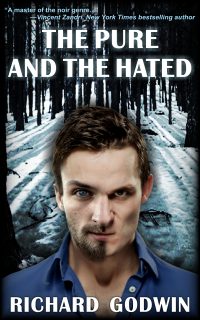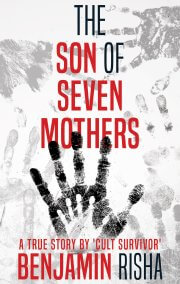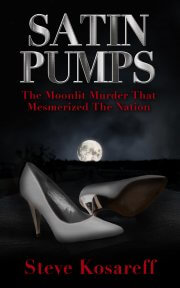A man takes a stranger into his house only to unleash a savage lesson from the past…

THE PURE AND THE HATED by acclaimed noir author Richard Godwin is now available!
Synopsis:
A psychological crime novel about the past, the nature of justice, family secrets, the nature of forgiveness, revenge, identity, hunting and predation. Shepherd Butler, the protagonist and narrator of the novel, and his wife Mary are grieving the death of their son Felton to a hunting accident in Vermont, when Shepherd finds a stranger freezing in the forest he offers him a home.
The man, Maxwell Heed has suffered personal tragedy when his fiancée was murdered. He becomes part of the family and Shepherd’s nieces, Marigold and Joyce, and his sister Holly, instantly take to Maxwell, who is a sincere and religious man, seeking to understand the nature of forgiveness. The father of Shepherd’s nieces, Dwight Fisher, ran off years ago and Shepherd takes an active part in their lives. Maxwell feels like another family member. He tells Shepherd and Mary of the man who killed his fiancée, Temple Jones.
Temple Jones is a dangerous psychopath who preys on women. He has escaped justice. Maxwell fears he has followed him to Vermont. Shepherd tries to allay Maxwell’s fears. Maxwell disappears leaving a note saying he has seen Temple Jones. Then Temple Jones turns up.
His arrival brings tragedy into their lives, leaving Shepherd and Mary asking searching questions of themselves. He targets Shepherd’s family and Shepherd struggles to protect them. Temple knows too much about them, as if he has investigated their lives. When the police arrive Temple escapes, disappearing from the state. Then Shepherd reads of some crimes in New Hampshire, which he believes are the work of Temple.
He goes to look for him and for answers. And as Shepherd hunts for Maxwell he is in for a profoundly unsettling shock. It is a dénouement rich in revelation of the kind that asks deep questions about the identity of the protagonist. Using the natural beauty of Vermont as a backdrop to the action, the novel explores forgiveness and our understanding of one another. It explores family relations and the mind of a psychopath.
What others are saying about the book:
“Godwin writes intelligent noir from a unique psychological perspective, delving deep into the nobler motives and emotions of his engaging characters while examining the darkest corners of the human heart. The faceless villain in this chiller is as real as a razor cut. The Pure and The Hated is a story of love, generosity, betrayal, courage, evil, and hope. All set against a beautifully-rendered backdrop of Vermont. Before you sit down on a cool dark night to enjoy this one, make sure the doors and windows are locked.”–Phil Bowie, author of the John Hardin suspense series
From the book:
“Marigold and Joyce lived in a farm house by the red barn that passing tourists used to photograph. They came to that part of Vermont for the skiing, they’d hit the slopes, fill the restaurants, and leave with their memories. I envy them now, I wish I could exchange my memories for those of another man. I have no vacations left inside me.”
“I am unmanned by events beyond my control and seek the feminine to prove myself again. I have become the castrated father of the tribe, my children are butchered, my possessions looted.”
“That is the purpose that hatred serves. But I will not yield to that poisoned Bible. There was a time before corruption. I seek to separate the past from the wounds he inflicted.”
“His deeds invaded us like a virus, replicating their own hatred inside us, taking away the things we once believed in. And while I can still see myself making love to Mary that day I can also smell the fresh grass and see the Columbine’s spurs and feel the ones that Temple Jones wore cutting into my sides, as if he was on my back without my knowing, all along, even then.”
Acclaim for Richard Godwin’s writing:
“A psychological look at the meaning of image, sense of self, and identity. With extraordinary writing, characterisation, and storytelling, Godwin is truly one of our great writers.” —Luca Veste author of Dead Gone.
“Richard Godwin knows how his characters dress, what they drink and what they drive. He knows how they live— and how they die. Here’s hoping no one recognized themselves in Godwin’s cold canvas. Combines the fun of a good story with the joy of witty, vivid writing.” —Heywood Gould, author of The Serial Killer’s Daughter.




 Join our email list
Join our email list
Leave a Reply